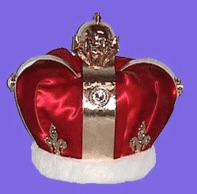Study to shew thyself approved unto God, a workman that needeth not to be ashamed, rightly dividing the word of truth. 2 Tim. 2:15

King James AV1611
The Kings of Israel
The Kings of Israel was taught by Dr. James Modlish
Lesson Four
David Made King
(2 Sam. 1-5)
Introduction:
These chapters describe the events leading up to David’s crowning as the King of Israel. II Chron. 10:1-14, 11:1-19, and 14:1-8 are parallel accounts.
I. David sorrows over Saul’s death - ch.1-2:7
David had been offered more that one opportunity to eliminate Saul, his sworn enemy, but he had refused to raise his hand against the “Lord’s anointed” (I Sam. 26:9) From human perspective David could have rejoiced over Saul’s death, but lamented over it. (1:17)
Of course, David’s dear friend Jonathan was also dead; it is too bad when the sin of a disobedient father brings judgment upon innocent people.
A. Note that an Amalekite brought the news and claimed to be the one who finally took Saul’s life.
Had Saul obeyed the Lord in I Sam. 15 and slain all of the Amalekites, this would have been impossible. The sin we fail to slay is the one that slays us.
(Deut.25:17-19) The men of Jabesh-gilead planned and executed a daring mission to retrieve the bodies of Saul and Jonathan. Forty years previous Saul had rescued Jabesh from Nahash the Ammonite. (I Sam 11) Their gratitude extended to a future generation.
(I Sam. 31:8-13; II Sam. 2:4-7) Even though Saul was a rogue in many respects, and it is reasonable to assume that the people of Jabesh-gilead knew that. their loyalty and gratitude prevailed. This is character that is rewarded with kindness and truth. (II Sam. 2:6)
II. David struggles against Saul’s family - 2:8-4:12
A variety of political intrigues plagued David throughout his life. Even though David sought the mind of God, he could not entirely escape the plots and plans of his associates, and because he was indebted to these men, it was difficult to control them.
A. The murder of Asahel - II Sam. 2
Joab, Abishai, and Asahel were all sons of David’s half-sister, Zeruiah. (I Chron. 2:16; II Sam. 17:25) Thus, they were David’s nephews as well as valued men in his army. David first reigned over Judah, his own tribe, with his headquarters in Hebron. However, Abner, the commander of Saul’s army, had made Saul’s son, Ishbosheth, the king over the other tribes; but he relocated the capitol over the Jordan River in Mahanaim. This was to protect himself and the new king from David’s men. Abner had a personal interest in the household of Saul since he was Saul’s cousin. (I Sam. 14:50) Abner thought it was to his advantage to see Ishbosheth reign, but he deliberately rebelled against God’s word when he crowned him. God had made it very clear that David alone was to rule over Israel. The entire incident reminds us of the conflict in the Christian’s life:
The forces of Abner (the flesh) are destined to defeat – (II Sam. 2:12-17: Romans 7:23-25)
Rather than surrender, Abner flees. There is Asahel (a type of the Holy Spirit) who pursues and will not turn aside. (2:19-21) Some are so determined to serve themselves that they effectively kill the voice of the Holy Spirit. (I Tim.4:2)
-Page Navigation-
Lessons: 1 | 2 | 3 | 4 | 5 | 6 | 7 | 8 | 9 | 10 | 11 | 12 | 13 | 14 | 15 | 16 | 17 | 18 | 19 | 20 | 21

